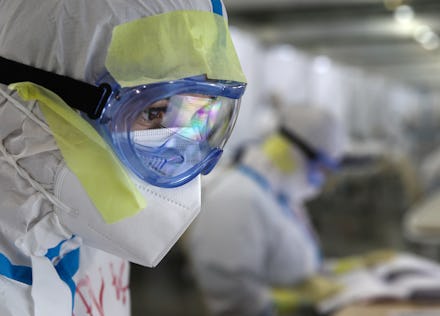The government has pledged almost $2 billion to companies with no experience making medical supplies

The shortage of personal protective equipment in the United States continues to be a major problem. Without it, health care professionals are at increased risk while caring for coronavirus patients. But the mad scramble for supplies has led to the federal government signing massive PPE contracts with untested suppliers — and worse, some multimillion-dollar orders aren't turning up at all.
On Wednesday, a CNN report found that nearly 1 in 5 coronavirus-related contracts for $1 million or more went to companies who had never contracted with the federal government before. Per the outlet, this includes vendors who have shifted to producing PPE in response to the pandemic, like a tampon manufacturer in Ohio that now makes face masks.
Companies shifting their production lines to make PPE by itself isn't a problem. In fact, early on in the pandemic, many pleaded with President Trump to invoke the Defense Production Act to help states obtain necessary equipment like PPE and other medical supplies. However, Trump didn't invoke the law, which allows the executive branch to dictate manufacturing priorities to companies, until April because CEOs asked him not to.
Signing numerous big contracts with untested suppliers is hardly the solution, though. ProPublica reported Wednesday that in total, the Trump administration has pledged about $1.8 billion worth of contracts to 345 companies who had no prior experience working with the federal government. That's "about 13% of total government spending on pandemic-related contracts of $13.8 billion," ProPublica determined.
Earlier this month, the Federal Emergency Management Agency cancelled a $55 million contract it signed with Panthera Worldwide, a Virginia-based firm that didn't have a history of producing medical equipment. Panthera failed to make the masks, an outcome Rep. Bennie Thompson (D-Miss.), chair of the House Homeland Security Committee, said was "predictable."
"As demonstrated during the 2017 hurricane season, FEMA unfortunately has a history of awarding contracts for critical goods and services to companies that ultimately can’t deliver what they promise,” Thompson said, according to The Hill.
He went on to add:
“In this case, FEMA awarded a $55 million contract to a company for 10 million masks that it did not deliver by the initial May 1 deadline or extended deadline of May 11. This was predictable as the company has no prior experience obtaining medical supplies or equipment. FEMA must do better vetting companies during this pandemic. The health and safety of our first responders depends on obtaining a sufficient quantity of these essential N95 masks and other personal protective equipment."
In addition to signing massive contracts with companies that don't have experience producing medical equipment, CNN found that a handful of contracts have specifically gone to firms run by people who worked for or donated to Trump. For example, the government awarded a $3.24 million deal for masks to a company owned by Zachary Fuentes, a former Trump administration aide.
The federal government has made several questionable deals as it struggles to deal with coronavirus. The Pentagon spent hundreds of millions on mask-washing machines that turned out to be useless, which NBC News reported was part of a larger trend of the White House task force rushing into contracts so Trump can have a steady stream of deals to announce.
“They’re always swinging for the fences hoping that one time they’ll hit a grand slam,” one administration official told NBC News. “They’re gambling that they’ll win one time, and if they don’t they’ll just deflect, which is what we see inside all the time.”
Unfortunately, the federal government's current scramble to obtain PPE supplies — and the resulting mess — is largely a problem of its own creation, caused by its poor initial preparation for the pandemic. Documents show that the Trump administration basically ignored coronavirus for two months.
"Given how awfully late the White House came to recognize the epidemic, it was too late for orderly and competitive purchases," Charles Tiefer, a University of Baltimore law professor who studies government contracting, told CNN. "The businesspeople who sell PPE to the government, particularly the middlemen who are in it for the immediate profit, can expect confidently to make a bundle — if not a killing."